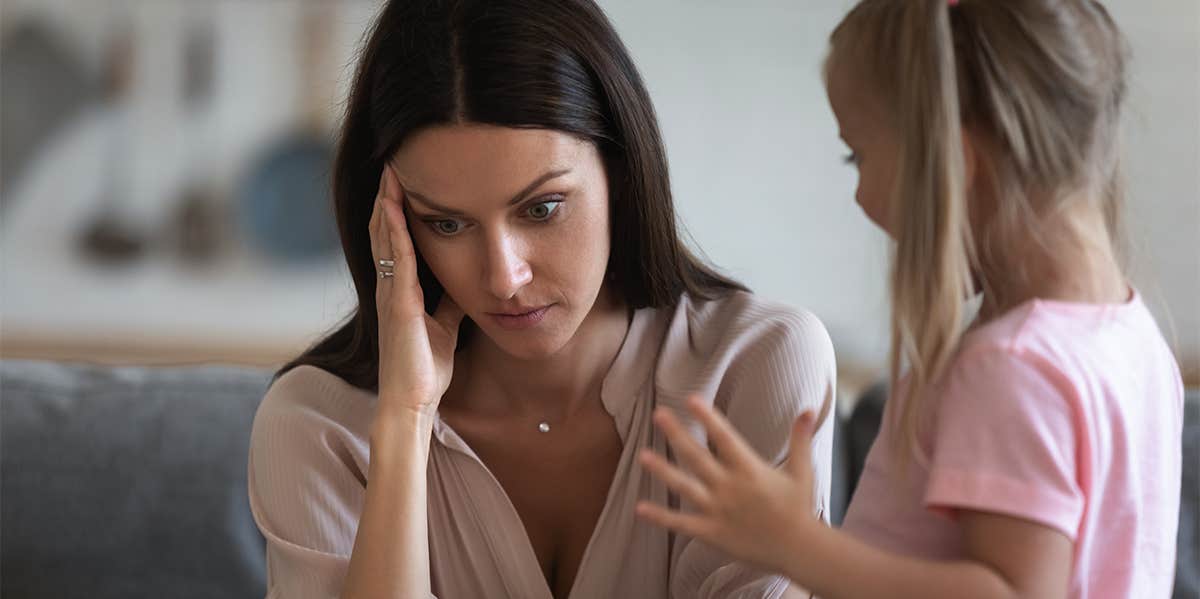You Don’t Like Your Kid? Beware.
Chances are good there’s something more going on.
 fizkes / Shutterstock
fizkes / Shutterstock As a parent, you have already experienced many conflicting emotions: love, kindness, protectiveness, frustration, anger, confusion, resentment, happiness, gratitude, pride, sadness, embarrassment, and on and on.
Especially if you had to go the extra mile to become a parent.
Maybe you were older, infertile, miscarried frequently, or were pressured by well-meaning friends or family. Maybe you went through IVF or had an abortion in the past or were a foster parent or adopted.
You know what it took to get to this point.
This is why the feeling of dislike, as socially unacceptable as it is for a parent, gets pushed aside, hidden, or denied. Or laughed away, if it comes up at all.
I’m not talking about just irritation. Or even rage.
I’m talking about when you look at that one child and you just feel nothing. Not just that, but you dislike them actively. You feel guilty about it. You go through the motions, you do the right thing, but you don’t feel connected.
Perhaps you have other children, and they do feel like your kids. You run your hands through their hair or pull them in for a hug.
But that one child. Something just feels…off. There’s no tactile affection, no spiritual connection, and no easy-going back and forth.
You choose to love them, of course.
- You make sure they’re fed, clothed, involved in art or sports or church or volunteering.
- You force yourself to hug them.
- You listen, you ask questions.
- You praise and encourage.
- You confront when necessary.
- You buy them stuff
[I’m not talking to narcissists or sociopaths or psychopaths. I’m aware there are people who don’t really feel love towards others and only use them for energetic supply.]
Attunement is important in all relationships but especially parenting.
It’s emotional but also spiritual.
If you came from a family where your emotions were invalidated, ignored, or even demonized, then you learned to suppress them or mask them.
If you came from an overtly abusive family, you learned to read the room and the mood. Your survival may have depended on it.
In my experience, the child we can’t feel an attachment to, or actively dislike, is hiding something. They don’t WANT you to know their true selves, because something inside is very dark and twisted.
Assuming you are indeed a safe and caring parent, then the issue is not with you. Understand that now, because otherwise, the guilt may blind you.
Most children, at least up to a certain point, will give you endless clues to their well-being. They’ll talk about it, draw it, act it out.
If you’re a decent parent, you know their favorite color, favorite food, best vacation, best friend’s name, what makes them sad, etc.
If you have a child who is a stranger to you, that’s by design on THEIR part. Kids/people want and need to be truly known, understood, and loved.
The child who is hiding something…if you get too close to their real selves, they will distract, walk away, deflect, lie, gaslight you, start stuff, get very angry, and hide as if their lives depend on it.
You’re left feeling like the bad guy. That’s on purpose. They need you to focus on how “bad” you are so that you don’t catch on to who they really are, or what they’re up to behind closed doors.
That’s when you need to tune into your feelings even harder.
What are they showing you? Are they bullies? Are your younger kids complaining that that one child is hurting them?
Sibling abuse is REAL. And we brush it away as if they’re “just being kids” when in reality the damage that happens under our own roofs lasts for years. And they do blame us if they tried to tell us about it and we did nothing.
Here’s the thing: the kids who get picked on sound like the kid who cried wolf. They seem like drama kings/queens. They’re the ones who get caught retaliating and get into trouble, not the actual shit-stirrer.
He/she/they just sit back and look smug. They act like a tiny saint.
I know how tired you are. I know how stressed you are. I know how little time you already have for yourself. I know your spouse is not attentive enough.
Adding another layer of fear to this feels unfair.
But you know what’s worse?
Having to call the police on your own child. Watching that child be led away in handcuffs. Putting the pieces of the other children and yourself together after the fact. For YEARS.
You must pay attention, believe what you feel and see, and do something before it gets to that point.
I’ve been there. Okay? I’m speaking from experience. I’m not judging. But I am concerned about what I see happening inside the families of the people I work with.
Elizabeth Park is an ex-fundamentalist turned narcissist recovery coach and intuitive healer. Read more of her writing on Medium.

